
Wes Mountain/The Pharmaceutical Journal
At the University of Manchester, fourth-year MPharm students complete a five-day social care placement in a nursing residential care environment. These placements go beyond observing care — they are essential to their education by preparing students for the multifaceted roles that they’ll encounter in their careers.
Pharmacy students build a strong foundation in clinical knowledge and skills within the MPharm course, with this social care placement offering a unique opportunity to apply these skills in a real-world setting. This placement introduces students to a care environment where pharmacists will work more closely in the future, which addresses the needs of a growing population with multimorbidity and complex care requirements.
Why was the social care placement set up?
The social care placement provides pharmacy students with hands-on experience and showcases the vital role pharmacists play in social care settings, especially in residential care homes. Many pharmacists work in these environments via managing medicines and conducting reviews for residents with complex health needs. With this in mind, it is crucial that pharmacists learn to integrate their expertise into multidisciplinary teams (MDT).
Designed with care home staff, the Greater Manchester Training Hub and the University of Manchester’s social care pharmacy lead, this placement mirrors real-world challenges. During the placement, students collaborate with nurses, GPs and other professionals, focusing on medicines management, person-centred care and resident wellbeing.
This initiative equips students with clinical knowledge and communication skills for effective person-centred care, while ensuring that they understand the regulatory, ethical and operational frameworks they will encounter during their pharmacy careers.
What does the placement entail?
The five-day placement offers a structured, yet flexible, learning environment. Here is what students can expect during their time at the residential home:
- Medication management and review: Students proactively review medicines for residents to ensure that prescribed treatments are appropriate;
- Audit of missed medicines doses: Students develop an understanding of why doses may be missed;
- Contributions to resident care: Under supervision, students make interventions, which include recommending dose adjustments for weight, suggesting medicines switches to reduce fall risk and advising on thickener switches;
- Presentation of learning: Students deliver a ‘learning at lunch’ presentation, which covers topics such as fall risks and the development of communication and presentation skills;
- Engagement with residents: Students engage directly with residents, participate in social activities and build rapport, which fosters empathy;
- Collaboration with the MDT: Attending MDT rounds allows students to collaborate with healthcare professionals and interact with staff and residents under tutor guidance.
What will students gain?
The outcomes of this social care placement go beyond academic learning. Some essential takeaways based on student feedback are:
- Improved professionalism and confidence: The placement enhances students’ professionalism and communication skills. Engaging with residents and healthcare teams deepens their understanding of person-centred care, which is essential for future practice;
- Hands-on clinical experience: The students apply classroom knowledge in real-world scenarios, make clinical decisions about medicines and engage with residents, which provides insight into care challenges;
- Enhanced knowledge of social care: The placement enables students to learn how pharmacists collaborate with professionals to promote holistic care and understand the impact of chronic conditions, medicines and social factors;
- Ethical and professional development: The students are encouraged to reflect on ethical implications, particularly around safeguarding vulnerable residents, fostering critical thinking and professionalism.
Feedback from students and tutors
Both students and tutors praised the placement for bridging the gap between academic learning and real-world application, with students valuing the opportunity to engage meaningfully with residents in the care home environment.
One student shared that they “liked how involved we got to become with the residents, spending time… to keep them company, which they seemed to really appreciate”.
“We also got to speak to the residents’ next of kin, which made us feel involved in their care,” they said.
The five-day social care placement is a valuable opportunity for pharmacy students to bridge the gap between academic learning and real-world practice
Another student reflected on the importance of understanding prescribing practicalities in social care settings, noting: “I enjoyed seeing this sector. It gave me an insight into how prescribing the correct medication formulation is so important to staff and patients.”
Tutors highlighted collaboration and learning, with one saying that the students “worked really collaboratively with the team”.
“They were not fazed by all the questions nurses asked them about medicines. If they weren’t sure they looked things up and came back with answers.
“I’ve really enjoyed having them, and they’ve even shared knowledge with me… I’ve been nursing now for 20 years, so things have changed. They’re educating me, really,” they added.
Another tutor commented that having the students on placement “has had a really positive impact on some of our residents that have been able to sit down and speak with them — they love a new face to talk to”.
Empathy and professionalism
The five-day social care placement is a valuable opportunity for pharmacy students to bridge the gap between academic learning and real-world practice. By engaging with residents, collaborating with teams and reflecting on ethical responsibilities, students are prepared for future challenges.
The placement enhances clinical knowledge and communication skills while instilling empathy and professionalism. Through this initiative, the University of Manchester ensures future pharmacists are equipped to improve the health and wellbeing of residents in social care settings.
2 comments
You must be logged in to post a comment.



What an excellent idea. Should be copied across the board if not already happening elsewhere.
Agree working in social care helps with understanding of the use of medicines in the patients home and healthcare settings. The 5 days is a taster and should be done before students take up pharmacy at degree level. Like the MCAT qualification and experience required by medical students this could form and apprenticeship foundation to the course and also stop people entering the profession who don’t know what pharmacy entails and its link with social care
Care homes domicillary care community care including out of hours / hospital care with focus on patients with different age groups and seasons and the top 100 medicines used in these areas needs to be part of the curriculum and over the 6-12 weeks per year eg including summer holidays / Christmas holidays ( covering seasonal variation of diseases and different medication requirements allowing practice experience gained to be a foundational pharmacist ready to prescribe if necessary